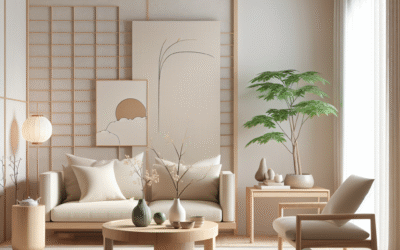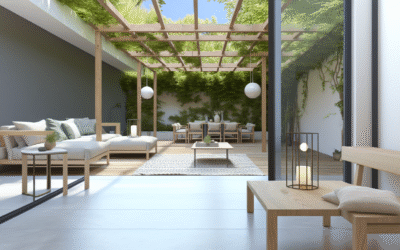
Introduction
Are you feeling overwhelmed by the chaos of modern life? The answer may lie in embracingJapandi style and creating minimalist zen spaces in your home. Japandi beautifully combines Scandinavian functionality and Japanese aesthetics, promoting calm, balance, and harmony. In a world where clutter often reigns, these design philosophies offer an antidote, creating serene interiors that enhance your well-being.
In this guide, you’ll learn what Japandi style is, how to implement its principles in your space, and the benefits of minimalist zen living. Expect actionable tips, insights from design experts, and a roadmap that takes you from confusion to clarity in crafting your tranquil haven at home.
Understanding Japandi Style
What is Japandi Style?
Japandi style merges the refined beauty of Japanese design with the practicality of Scandinavian decor. Characterized by simplicity, natural materials, and muted color palettes, this aesthetic promotes a sense of tranquility.
Key Characteristics
- Natural Materials: Use wood, stone, and textiles to create a tactile environment.
- Neutral Color Palette: Embrace earthy tones and soft pastels, evoking calmness and peace.
- Simplicity: Focus on functional yet beautiful pieces that contribute to the overall harmony of the space.
- Minimal Decor: Reduce excess and prioritize quality over quantity in your furnishings.
Creating Minimalist Zen Spaces
Identifying the Essence of Zen Design
Zen design encourages a peaceful environment that fosters mindfulness and well-being. The essence of a zen space lies in its simplicity and natural elements.
Practical Steps to Achieve Minimalism
- Declutter: Start with a decluttering session to remove non-essential items.
- Choose Calming Colors: Paint walls in soft tones that promote a sense of peace.
- Incorporate Nature: Bring in plants and natural light to establish a connection with the outdoors.
- Mindful Furniture Choices: Invest in furniture that serves multiple purposes without compromising aesthetics.
The Benefits of Japandi and Zen Spaces
Enhancing Well-Being
Living in a space designed with Japandi and zen principles can significantly improve your mental health. Studies have shown that minimalism in interior spaces can lead to reduced stress levels and increased concentration.
Emotional Connection to Space
Your environment influences your mood and energy. Creating a space that echoes tranquility can boost happiness and well-being.
Sustainability and Mindfulness
Both Japandi and zen design encourage conscious consumption, promoting sustainability through quality furnishings that last. This approach fosters a mindful mindset, encouraging us to appreciate what we own.
Practical Tips for Implementing Japandi Style at Home
Room-by-Room Guide
Living Room
Use neutral tones, and select furniture with clean lines. Incorporate natural fabrics and a natural light source, like large windows, to enhance the space.
Bedroom
Choose a low-profile bed frame and minimal decoration. Utilize soft textures and warm lighting for a serene atmosphere.
Kitchen
Opt for open shelving and declutter countertops. Incorporate wooden utensils and a few elegantly displayed dishware items.
Case Studies: Successful Japandi Implementations
Real World Examples
Let’s explore a couple of case studies where homeowners successfully integrated Japandi aesthetics into their spaces.
Example 1: Modern Family Home
A family in Seattle transformed their living space by replacing bulky furniture with minimalist, multi-functional pieces. The result? A peaceful, inviting home that embodies the Japandi ethos.
Example 2: Tranquil Urban Apartment
In a bustling city, a couple renovated their apartment to create a sanctuary. They chose light wood, soft fabrics, and integrated plants, resulting in a zen-inspired retreat amidst the urban chaos.
Visual Inspiration: Infographics and Images
Consider creating infographics illustrating key design principles of Japandi style and visual examples of minimalistic zen spaces. Image galleries showcasing various implementations can also serve as inspiration for readers.
FAQ: Your Japandi and Zen Design Questions Answered
What are the main principles of Japandi style?
The main principles include natural materials, a neutral color palette, simplicity, and minimal decor.
How can I declutter my space effectively?
Start by categorizing items into keep, donate, and discard piles. Focus on one room or area at a time.
What colors are best for creating a zen atmosphere?
Opt for earthy tones, soft pastels, and neutral shades to evoke calmness.
Are there specific plants recommended for zen spaces?
Popular choices include bamboo, peace lilies, and bonsai trees, which promote tranquility.
How do I choose furniture for a Japandi style room?
Select pieces that are functional, made from natural materials, and feature clean, simple lines.
Conclusion and Next Steps
In conclusion, embracing Japandi style and minimalist zen spaces allows for a tranquil lifestyle that resonates with well-being and mindfulness. By implementing the principles discussed in this guide, you can transform any space into a serene haven. Start by decluttering your environment, choosing calming colors, and investing in quality furnishings. Ready to dive deeper? Explore our related articles on sustainable design and mindful living to further enrich your journey.
Content Disclaimer
Information provided for educational purposes. Not professional financial advice; consult experts. Not medical advice; consult healthcare providers. May contain affiliate relationships.
Categories
- Accent Walls & Ceilings (84)
- Art Curation & Gallery (83)
- Bedding Style Trends (89)
- Bedroom Makeover (96)
- Bohemian & Eclectic Styles (80)
- DIY & Budget-Friendly Decor (78)
- Eco-Friendly Design (83)
- Furniture Care (87)
- Home Decor & Design Ideas (181)
- Home Wellness Spaces (103)
- Integrated Outdoor Living (91)
- Japandi Style (84)
- Kids and Nursery Decor (73)
- Living Room Decor (99)
- Mix & Match Techniques (95)
- Modern & Contemporary Design (88)
- Rug Sizing & Placement (89)
- Scandinavian Design Inspiration (51)
- Seasonal Home Decor (100)
- Small Space Solutions (93)
- Wall Art & Painting Tips (94)
Recent Comments
Archives
Product Gallery
-
Majestic African Wildlife Canvas Art for Stylish Home Decor
Rated 5.00 out of 5 -
Cozy Irregular Green Plush Rug for Nordic Living Spaces
Rated 5.00 out of 5$33.00 – $203.00Price range: $33.00 through $203.00 -
Scandinavian Geometric Area Rugs for Stylish Home Décor
Rated 5.00 out of 5$25.00 – $365.00Price range: $25.00 through $365.00













